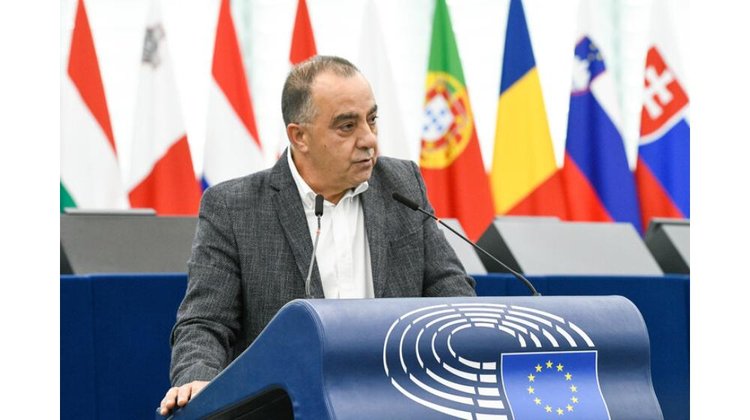Giorgos Georgiou: Cyprus’ narrow economic activity is a problem for the country
Donna Kaparti 08:09 - 13 August 2024

While AKEL MEP Giorgos Georgiou recognises the limited scope of influence in the Community budget, he nevertheless expresses his willingess to claim funds that will strengthen the country, with an emphasis on the social dimension.
He describes his positions and priorities regarding the Cypriot economy and the wider European political scene, through in an interview with InBusinessNews.
Georgiou points out the importance of the harmonious development of the private sector, especially small and medium enterprises, in conjunction with the public sector, recognising the sustainability problems they face due to the economic crisis.
The AKEL MEP strongly criticises the "neoliberal approaches of the European Union", which he considers harmful to the poorest strata of society. At the same time, he highlights the need to diversify the Cypriot economy beyond tourism and services, as well as the strengthening of the primary sector. On the political level, Georgiou points to his collaborations with left-wing, socialist and green groups in the European Parliament, stressing the importance of consistency and cooperation to achieve goals.
How do you intend to contribute to strengthening the economy of Cyprus with your presence in the European Parliament?
The margins of our influence regarding the Community budget are limited, because economic policies are determined by the European Commission. However, I could, through our interventions in the various committees we participate in, contribute to securing various funds that will strengthen the Cypriot economy. We are talking about subsidies of various sectors of the economy that we would like to have a social character, that is, to serve the interests of the wider society or other European programmes in which individuals or various collectives can participate.
The private sector is a key factor in the economy. What specific actions do you intend to take to boost businesses operating in the country?
For us, the private sector is an important factor for the development of the Cypriot economy. Especially when it coexists harmoniously and develops within healthy frameworks, at the side of the public sector. As in the past, we will continue to contribute to its development with our various amendments, aiming in particular for the protection and strengthening of small and medium-sized enterprises that pay huge costs and face sustainability problems due to the ongoing economic crisis, which is plaguing Europe as well as Cyprus.
The "red line" and the obstacle to development
What is an economic policy that you consider a "red line" that you would not support or vote for?
The policy implemented today by the European Union: These are neoliberal policies that support big capital and leave aside the needs of the poor and middle classes of the European people. As an example, I mention that approximately 95 million European citizens are on the poverty line. Even though there are some positive aspects to the European budget, we as the Left are voting against it, precisely because it passes through this neoliberal philosophy.
What do you consider to be Cyprus’ biggest problem that prevents its further development and the rise of its GDP?
The biggest problem facing the Cypriot economy is the narrow nature of economic activity. It is an economy that is mainly focused on tourism and services - but these are vulnerable sectors, facing huge risks from negative effects coming from external factors. See for example what is happening in the region with the wars, but also the blow suffered by the service sector through the scandal of the golden passports. What is needed are innovative actions that will embrace other sectors of economic activity.
Strengthening agriculture and animal husbandry
What, in your opinion, is the sector of the economy that is underperforming and you think should be strengthened further?
A sector that should receive special attention is the primary sector, which concerns agriculture and animal husbandry. The world and Europe are facing huge challenges nowadays, suffering from food insecurity. The state must encourage the entry of young people into these sectors by offering them attractive incentives. Precisely, because it is a sector of national priority.
With which political formations have you come closer during your tenure?
Apart from the Left, in which we have always participated and developed significant activity, we are in particular contact with the Socialists and the Green group because many of our positions coincide with theirs, regarding the issues of democracy, the rule of law, the environment, and human rights. But a field of understanding is also being created with the European People's Party, especially with regard to the Cyprus issue through the processing of the European Commission's progress report with Turkey.
What is your advice to the newly elected for them to be heard more in the European Parliament?
To the new colleagues, I suggested and recommended the need to constantly demonstrate seriousness, consistency, a dialectical spirit, a willingness to cooperate. Mainly a policy beyond the Cypriot one and with issues that are of wider concern to European societies.
(Source: InBusinessNews)

